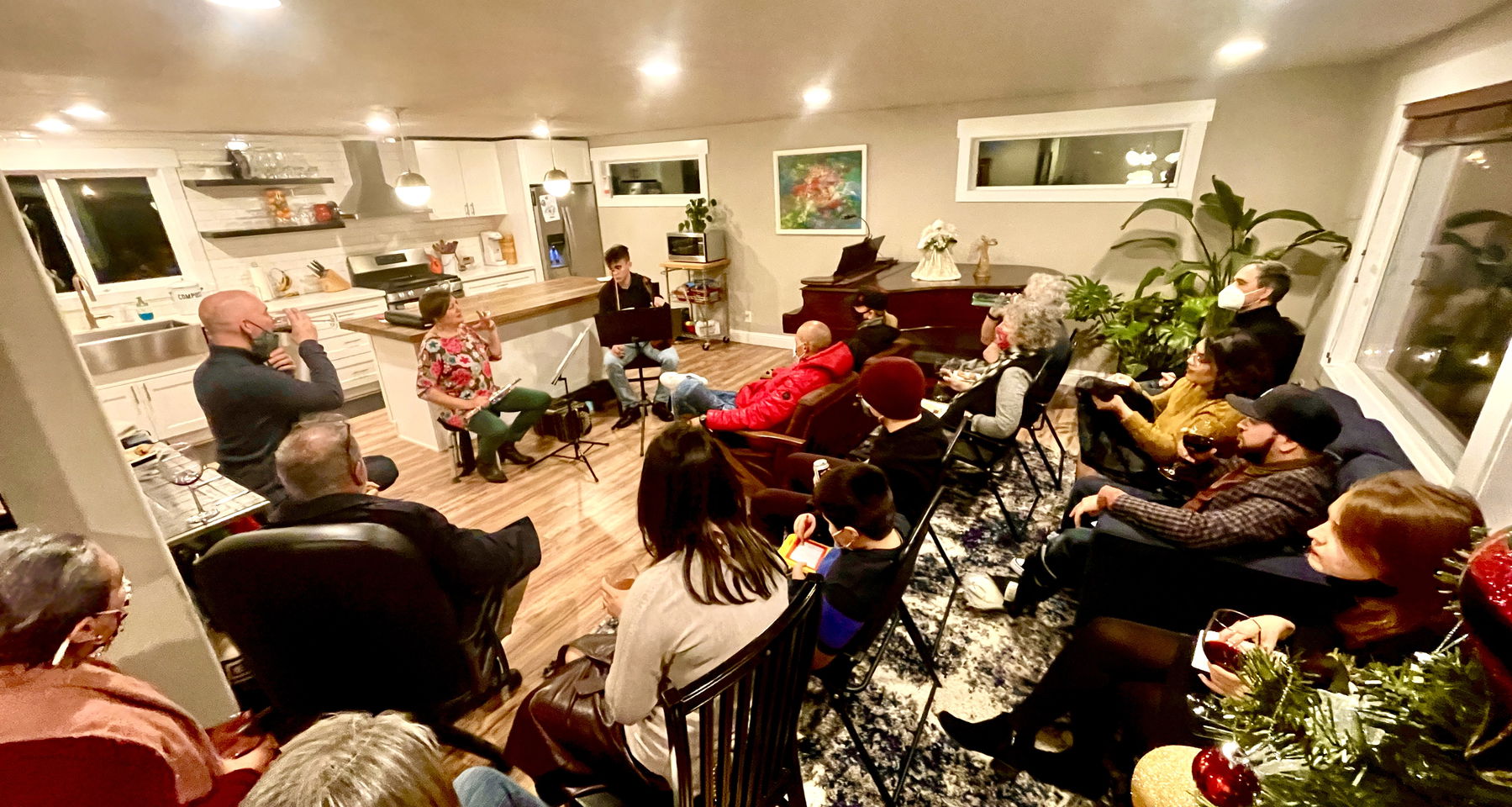

- Bring your own drinks
-
Wheelchair access
- Not wheelchair accessible
-
- Some stairs may be present in the space
This is a groupmuse
A live concert in a living room, backyard, or another intimate space. They're casual and friendly, hosted by community members.
Hosts
We are thrilled to invite a classically trained pianist to perform at our intimate indoor event. The evening will include pieces for Chopin and other composers played by non other than Bryan Hutchinson.
The event will include finger foods, before the show, as well as conversation with a bit of fun. There is a minimum donation of $25 that goes directly to the performer (of course if you really like what you hear you can alway pay more) 😀.
Please bring along your favorite beverage. Looking foward to seeing you all!
What's the music?
Bryan Hutchinson Piano Concert Program
GroupMuse Concert – Tony Barnes, Host
Jacob Gade – Jalousie
Alberto Ginastera – Dance of Maiden
Carlos Gardel - Por una Cabeza
Frederic Chopin – Barcarolle
Mason Bates - White Lies for Lomax
Oscar Peterson – Georgia
Sergei Prokofiev – Sonata #3
Fazil Say - Summertime Variations
Bryan Hutchinson Program and notes
Jacob Gade (1869-1963) wrote Jalousie in 1925 for the premiere of a silent film; “Don Q, Son of Zorro”. Inspired by a news article about a man who killed his wife out of jealousy, the tango quickly gained international success. Jalousie has been used in many movies, and recorded by many artists. September 2025 is the 100th anniversary of this piece.
Alberto Ginastera (1916-1983), influential Argentinian composer of the 20th Century, a student of Aaron Copland, and a teacher of Astor Piazzolla. Danza de la moza donosa (Dance of the Delightful Young Girl), a gentle 6/8 dancing melody flows, creating and releasing tension through chromatic inflections, and with a surprising atonal chord ending.
Carlos Gardel (1890-1935) - Por una Cabeza, one of his most popular tangos. Written in 1935, the song’s title is originally a horse-racing term “to lose by a head”. The lyrics bemoan a man’s life as it compares losing the horse race to losing with women. It was co-written by Alfredo Le Pera, shortly before they were both killed in a plane crash in Columbia in 1935.
(Tango arrangements by Uwe Korn (1962) - German pianist and composer.)
Frederic Chopin (1818-1849) Barcarolle in F-sharp Major, Op. 60 (1845) Romantic piece suggesting the mood of a gondola ride in Venice. The 12/8 time signature creates a rocking rhythm reminiscent of a boat on water. Often interpreted as a love scene or a landscape. Other Barcarolle composers were Brahms, Mendelssohn, Rossini, Verdi, Tchaikovsky, Schubert and Strauss.
Mason Bates (1977) White Lies for Lomax – 2007 Ethnomusicologist Alan Lomax (1915-2002), went to the American South to record the soul of the land. These early recordings included famous singers and a large group of anonymous blues musicians. White Lies for Lomax has wisps of blues fragments, which accumulate to an assertive climax. This homage ends with a sound sample of a Lomax field recording of early blues musicians, crossing paths with the remnants of the work. (Mason Bates' opera, The (R)evolution of Steve Jobs, premiered in 2017 at the Santa Fe Opera, selling out all performances. Santa Fe Opera's recording won the 2019 Grammy® for Best Opera Recording.)
Georgia On My Mind – Hoagie Carmichael (Oscar Peterson arrangement)
Sergei Prokofiev (1891-1953) Piano Sonata No. 3 in A minor, Op. 28 (1917)
Composed using sketches from 1907 "From the Old Notebooks". This is a dissonant, condense, one-movement sonata. The first theme is typical Prokofiev - extremes, jagged, and disjunct (I think it feels angry), the second theme is song-like. No. 3 is the shortest of his piano sonatas, but like the bulk of his work, demanding for the performer and demanding of the audience.
Fazıl Say (1970) Turkish-born pianist, composer, and arranger. He blends Western classical music with jazz and Turkish folk music, and explores themes of identity, freedom, and humanity.
Summertime Variations are based on the famous theme “Summertime” from George Gershwin's (1898-1937) opera “Porgy and Bess” (1935).
Where does this music come from?
This program is a variety of historical music, including compositions from the last @ 175 years. My programs are always a combination of diverse literature, based in part on what I'd like to learn/play in my goal to continue to challenge myself and grow as a musician.
Location
Exact address sent to approved attendees via email.
This is a groupmuse
A live concert in a living room, backyard, or another intimate space. They're casual and friendly, hosted by community members.
Hosts
 Continue with Facebook
Continue with Facebook
 Continue with Google
Continue with Google
 Continue with Apple
Continue with Apple
Comments
Comment sections are only for participants.